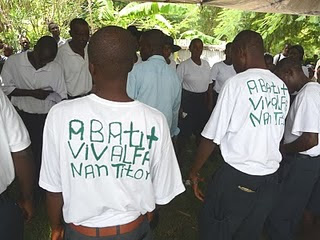One of the great tragedies in Haiti today is the large number of adults who are analfabete; illiterate, and not able to participate in the normal exchanges which are the foundation of contemporary society. For example, the majority of HAS’ animatrices, who are the front lines of the hospital’s connection with the residents of the HAS region, cannot read or write. For that reason, when we conducted a Risk Factor Analysis for infant malnutrition, we used a graphic check sheet so that all of the animatrices could participate.
The HAS alphabetization project has been operating for two years with the generous support of the Hummingbird Foundation, and has graduated more than 200 participants in a 2-year program of 3 afternoons per week.
Last Thursday, the 2010 graduating class invited Dawn Johnson and me to join them for their graduation ceremony in a shady church yard in Marin. More than 123 people from 8 mountain communities arrived for the ceremony, dressed in their finest, and quite proud of their achievement. Each of the community groups contributed something to the ceremony; a short theatre piece, a song, a dance, or speeches of welcome or gratitude, all of which involved reading.
One of the skits involved a small group walking to their Alfa class, and greeting a farmer in a field, inviting him to join them. “Too busy” he grunted. As the students walked back and forth each day, they told the farmer what they had learned. “I can measure my field and calculate my corn harvest” one said. Another said that she can read the label on a can of fertilizer. Another said that he will make a list of everything he will buy in the Verettes market. Eventually, the farmer’s restraint dissolved, and he followed the students off stage with his hoe on his shoulder, stimulating a standing ovation.
Agathe Geneus, our animated project coordinator, asked several participants what they could do now, that they could not do before the class. “I can read my child’s vaccination card” one said. “I can read my prescription, and now I don’t miss my medications” said another. One woman reported that now she can read with her children when they come home from school. An older farmer stated formally “Alfabetizaston se lavantage nou!”; being able to read and write gives us an advantage.
One group arrived in white shirts with a handwritten message on the back “ABA TI +”. All through the ceremony, I stewed over what this word meant. As the final act, they came to the microphone and sang a song about how they finally have learned to write their own names on documents, and don’t have to be embarrassed by having to make an X mark. Thus the motto on their shirt; “No more small cross”, sung with great pride.
Periodically during the ceremony, Dawn Johnson, who supports the literacy project, and I were invited to join the groups who were performing dances. Dawn is graceful, and I am less so. At a quiet moment, a young woman went to the microphone and, reading from a paper, announced that she wanted to ask me a question. She asked “How did you learn to dance, M. Jean?” The audience was teetering on the edge of open laughter, so, in as much of a deadpan I could muster, I said “I learned to dance from a book”, which gave everyone permission to give full vent to their laughter.
It’s possible that our culture has lost the gift of ritual in ceremonies; we have much to learn from Haitians, for whom ceremonies hold a vital function, to celebrate, to honor transitions, or to mark the beginning or end of important life stages. For the participants in this ceremony, their two years of effort were capped by a memorable, happy and important event. The flowery certificates which they took home with them will, long into the future, trigger memories of a morning in which they were honored for their commitment to self-development, and recognized for achievements. And I will long remember it also.
skip to main |
skip to sidebar






